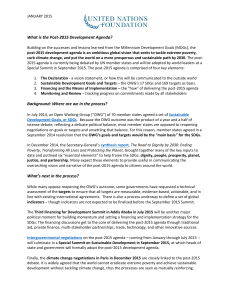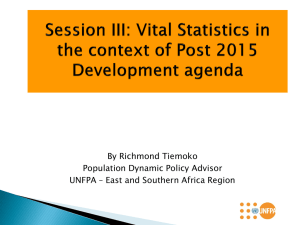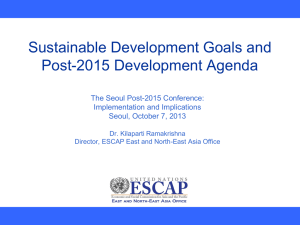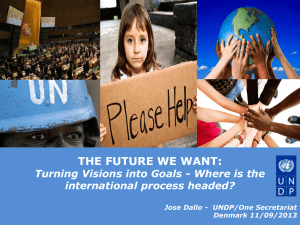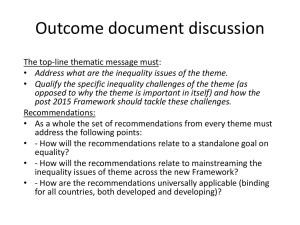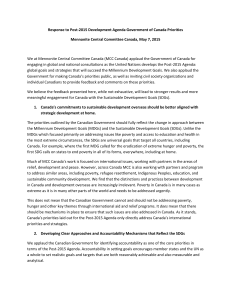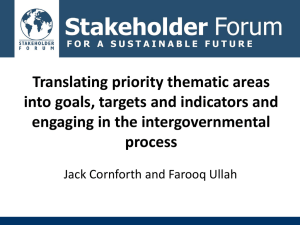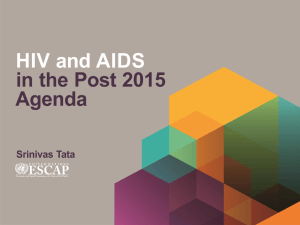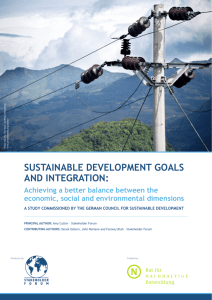here - Beyond 2015
advertisement
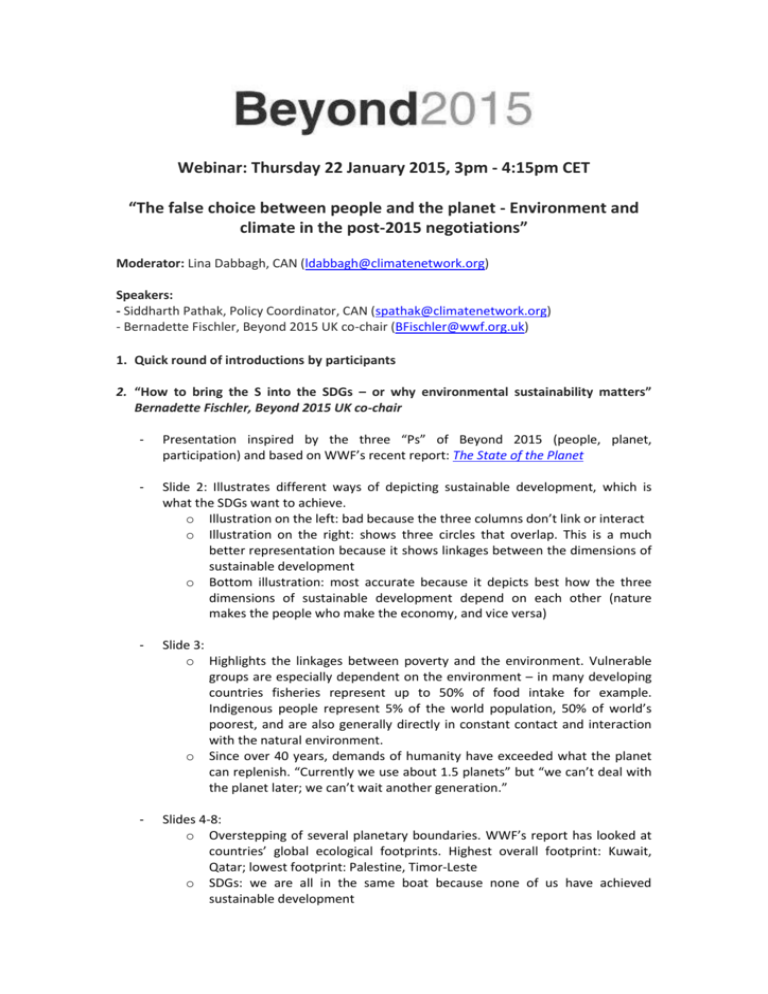
Webinar: Thursday 22 January 2015, 3pm - 4:15pm CET “The false choice between people and the planet - Environment and climate in the post-2015 negotiations” Moderator: Lina Dabbagh, CAN (ldabbagh@climatenetwork.org) Speakers: - Siddharth Pathak, Policy Coordinator, CAN (spathak@climatenetwork.org) - Bernadette Fischler, Beyond 2015 UK co-chair (BFischler@wwf.org.uk) 1. Quick round of introductions by participants 2. “How to bring the S into the SDGs – or why environmental sustainability matters” Bernadette Fischler, Beyond 2015 UK co-chair - Presentation inspired by the three “Ps” of Beyond 2015 (people, planet, participation) and based on WWF’s recent report: The State of the Planet - Slide 2: Illustrates different ways of depicting sustainable development, which is what the SDGs want to achieve. o Illustration on the left: bad because the three columns don’t link or interact o Illustration on the right: shows three circles that overlap. This is a much better representation because it shows linkages between the dimensions of sustainable development o Bottom illustration: most accurate because it depicts best how the three dimensions of sustainable development depend on each other (nature makes the people who make the economy, and vice versa) - Slide 3: o Highlights the linkages between poverty and the environment. Vulnerable groups are especially dependent on the environment – in many developing countries fisheries represent up to 50% of food intake for example. Indigenous people represent 5% of the world population, 50% of world’s poorest, and are also generally directly in constant contact and interaction with the natural environment. o Since over 40 years, demands of humanity have exceeded what the planet can replenish. “Currently we use about 1.5 planets” but “we can’t deal with the planet later; we can’t wait another generation.” - Slides 4-8: o Overstepping of several planetary boundaries. WWF’s report has looked at countries’ global ecological footprints. Highest overall footprint: Kuwait, Qatar; lowest footprint: Palestine, Timor-Leste o SDGs: we are all in the same boat because none of us have achieved sustainable development o - Environmental degradation is an issue impacting on poverty and it is linked to inequality – there is a lot to be done urgently! Many choices can be taken to manage resources within planetary boundaries Slides 9-10: highlight the importance of integrating each dimension of sustainable development into each SDG o Slide 9: “pizza” representation of the three dimensions of sustainable development: we don’t want the SDGs to focus separately on the three dimensions; instead we want each SDG to have targets for each dimension. The varying sizes of the three dimensions in the 2nd “pizza” illustrate the fact that the importance of each dimension varies between SDGs. o Slide 10: analysis of the integration of the three dimensions in each SDG proposed by the OWG: civil society must make sure that the balance of the three dimensions of sustainability is maintained and strengthened Questions and answers: Q1: The 17 SDGs contained in the OWG Outcome Document are not very balanced and there are some contradictions among them (e.g. water and energy). In your point of you, with this analysis of the three pillars of sustainable development, is it possible at this stage of the negotiations, to change something, to create a better balance of the three pillars of sustainable development? Answer (Bernadette): During a workshop WWF discussed 3 possible scenarios: 1. Everything changes (goals and targets) 2. 17 goals remain the same, but attempt made at fixing/changing the targets 3. Nothing changes. There is a very strong argument being made that it took long time and lots of efforts to come up with the 17 SDGs, so not to reopen the 17 goals for that reason. Bernadette’s personal feeling: most likely that 17 SDGs titles will stay as they are now, but countries will try to modify targets. Q2: Have you got updates from last three days of intergovernmental negotiations? Answer (Lina): - First day of negotiations focused on the UNSG synthesis report. Countries supported the SG report as a useful tool. All G77 countries and most developing countries want the OWG outcome document to be the main input for the negotiations. No surprise for most of us. But cards now on the table re what will be the main basis for negotiations. Big question about reopening OWG – now called “technical proofing”. France and Germany made a proposal for “technical proofing”. See attached document Developing countries see this proposal as the back door to reopening the OWG document, and they are hesitant about that, because they think this will lead to lower ambition. High level of mistrust re concept of technical proofing. Main consensus (apart from a few like UK and Korea): maintain 17 SDGs. - There were discussion on indicators and on the finance for development (FfD) process, and how this process should be linked to the post-2015 process, because the missing link from Monterrey (FfD process) is climate change. Climate change therefore needs to be brought into the FfD discussion. Co-chairs of FfD made a presentation on the second day of negotiations, around 3pm: webcast available - The Preparatory Stakeholder Forum showed that stakeholder engagement is useful. Q3: What recommendations do you have for organisations like Save the Children who have very limited resources on climate change and environmental sustainability, but do have teams working on SDGs? How best can they help on this agenda? Answer (Bernadette): don’t forget the Beyond 2015 environmental sustainable task force which has been around for long time but has been a bit inactive lately. It will be reactivated very soon through the Beyond 2015 google group and will be the space to share resources, updates, views, strategies, especially for people who are not working much on the environment. 3. COP 20 (Lima): “Outcomes and linkages to the post-2015 process” - Siddharth Pathak, Policy Coordinator, Climate Action Network - - Slide 2 - Main focus of Lima COP 20: deliverables (draft negotiating text), commitments from each country in the new agreement; pre-2020 (how to close immediate gaps) Slide 3 - Outcomes of Lima COP 20: overall disappointing: o Draft negotiating text (full of divergent views) o Pre-2020 ambition: no resolution, there will be high-level political engagement on and off, but this issue has been moved aside o Non-prescriptive directive on information requirements accompanying Intended Nationally Determined Contributions (INDCs) o Most interesting decision: new language of “common but differentiated responsibilities” and “in light of different national circumstances” Slides 4 and 5 – Linkages: o Political will in the post-2015 agenda will have a big impact on Paris COP21 o Financial package: will encompass climate finance and finance for development o Middle income countries, with big populations, are key players o Although the argumentation put forward by many developing countries is that development takes precedence over climate change, climate change impacts on development and we must achieve a strong climate goal Questions and answers (continued): Q4: What was the criteria for “technical proofing”? Answer (Lina): can’t quite remember, will share the proposal with the Secretariat, who will share it with everyone – see attached document Q5: negotiations in March will deal with goals and targets. So this means reopening the OWG outcome document? Answer (Lina): co-chairs said this negotiating session would be maintained. Countries have discussed their first opinion on OWG doc. They haven’t had much chance to engage on OWG13. This was the first brainstorming on where we are in the process. Reopening or not will be addressed in March. Q6: Fourth round of negotiations set for April (Means of implementation and Global partnership for development) – there are rumours that MoI will be addressed at the FfD Summit instead. Any information on this? Answer (Lina): yes this rumour is actually a proposal from Nordic countries. G77 not in favour of moving MoI to FfD process. Co-chairs have not made call.
